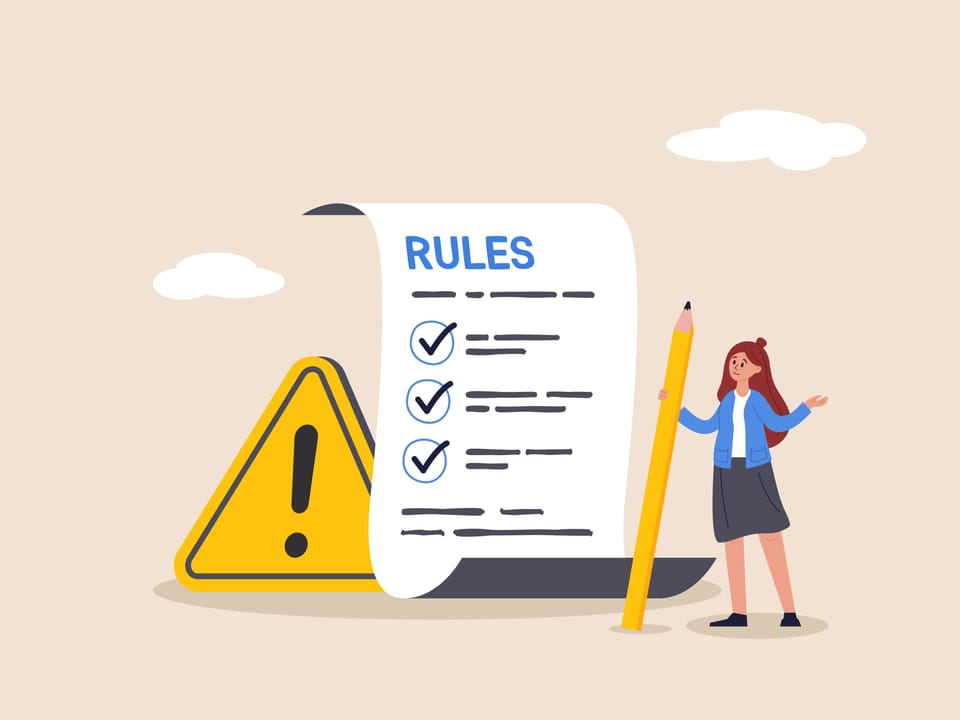10 Shocking HIPAA Violations That Could Happen In Your Organization

In the complex world of healthcare, maintaining the privacy and security of sensitive patient data is paramount. That's where the Health Insurance Portability and Accountability Act (HIPAA) comes into play. As an established framework for protecting patient data, HIPAA compliance is not just a legal requirement—it's a critical component of patient trust.
At Cycore Secure, we understand the challenges small businesses and startups face in meeting these regulations. That's why we're highlighting ten potential HIPAA violations that could occur in your organization. Our goal is to help you identify these potential pitfalls and provide guidance on how to avoid them, thereby ensuring your organization remains HIPAA compliant.
By exploring real-life examples and offering practical prevention tips, we hope to provide you with a valuable resource in your ongoing HIPAA compliance journey. Let's dive in.
Violation 1: Unauthorized Access
One of the most common HIPAA violations is unauthorized access to Protected Health Information (PHI). This occurs when an individual who doesn't have the necessary permissions accesses PHI. The culprit could be an employee snooping on records out of curiosity, or it could be a more malicious actor attempting to steal information.
Preventing unauthorized access begins with robust access controls. At Cycore Secure, we recommend implementing a policy of least privilege, where individuals only have access to the information they need to perform their job duties. Regular audits of access logs can also help identify any unauthorized access.
Moreover, it's essential to establish a culture of data privacy within your organization. This includes training employees on the importance of HIPAA compliance and the potential consequences of violations.
Violation 2: Improper Disposal of PHI
Proper disposal of PHI is a crucial aspect of HIPAA compliance that is often overlooked. Improper disposal occurs when PHI is discarded without the necessary precautions to prevent unauthorized access or data breaches.
A physical therapy practice in North Carolina learned this lesson the hard way when they discarded old patient files in a publicly accessible dumpster. Despite no longer needing these records, the practice was still responsible for protecting the information they contained. The resulting violation led to a substantial fine and loss of patient trust.
To avoid such a violation, we at Cycore Secure recommend implementing clear policies and procedures for the disposal of PHI. These should cover both physical and electronic records. Shredding, pulping, and burning are all acceptable methods for disposing of physical records, while electronic records should be cleared, purged, or destroyed in line with NIST guidelines.
Remember, just because you're done with a record doesn't mean your responsibility to protect it is over. Always ensure PHI is discarded properly to avoid an expensive and damaging HIPAA violation.
Violation 3: Unsecured Records
Securing PHI is a fundamental requirement of HIPAA, and the failure to do so can lead to significant violations. This involves not just electronic PHI, but also physical records and verbal information.
For instance, a medical center in Illinois faced a serious violation when a laptop containing unencrypted PHI was stolen from an employee's car. Even though the theft was out of their control, the medical center was held responsible because the PHI was not adequately secured on the laptop.
To prevent such violations, Cycore Secure advises organizations to ensure all PHI, whether physical or electronic, is adequately secured. Physical records should be stored in locked cabinets or secure locations, and access should be restricted. Electronic PHI should be protected with strong access controls, encryption, and secure networks.
It's also important to consider the security of PHI when it's being transported or communicated. Always use secure methods, such as encrypted emails, when sending PHI electronically, and be aware of your surroundings when discussing PHI verbally.
Securing PHI is not a one-time event but an ongoing process. Regularly review and update your security measures to ensure they keep pace with evolving threats and technologies.
Violation 4: Lack of Employee Training
Training employees on HIPAA compliance is crucial. Unfortunately, a lack of adequate training can lead to inadvertent violations, as employees may not understand their responsibilities under HIPAA.
A pharmacy chain in Washington faced severe consequences due to such a lack of training. An employee, unaware of the rules around PHI disclosure, provided a reporter with information about a patient’s prescription. This led to a significant HIPAA violation, hefty fines, and reputational damage.
At Cycore Secure, we cannot stress enough the importance of regular and comprehensive employee training. This should cover the basics of HIPAA, employees' specific responsibilities, and the potential consequences of violations. The training should also be tailored to your organization's specific needs and risks.
We also recommend maintaining records of all training activities. This can help you demonstrate your organization's commitment to HIPAA compliance in the event of an audit or investigation.
Your employees are your first line of defense against HIPAA violations. Equip them with the knowledge and tools they need to protect PHI effectively.
Violation 5: Failure to Conduct Risk Assessments
Regular risk assessments are a key requirement of the HIPAA Security Rule. Failure to conduct these assessments can lead to violations, as it may result in unidentified risks to PHI.
To avoid such a violation, Cycore Secure advises that your organization conduct regular and comprehensive risk assessments. These should identify potential risks to PHI, evaluate your current security measures, and identify areas for improvement.
It is important to remember that risk assessments are not a one-time event. They should be conducted regularly and whenever significant changes occur, such as when introducing new technologies or workflows.
At Cycore Secure, we also recommend involving all relevant stakeholders in the risk assessment process. This can help ensure that the assessment is thorough and takes into account all potential risks. Following the risk assessment, create a risk management plan to address any identified vulnerabilities.
Violation 6: Non-encrypted Electronic PHI
Encryption is a powerful tool in the protection of electronic PHI (ePHI), and failure to encrypt data can lead to severe HIPAA violations.
At Cycore Secure, we strongly recommend encrypting all ePHI, both at rest and in transit. Encryption turns readable data into coded text, which can only be read with a key. This means that even if the data is stolen or intercepted, it remains inaccessible without the key.
While HIPAA does not explicitly require encryption, it is considered an "addressable" requirement. This means that if you choose not to implement encryption, you must have a compelling reason and implement an equivalent measure to protect the data.
Encryption is one of the most effective ways to protect ePHI and prevent violations. Ensure you have robust encryption measures in place and that they are regularly updated to keep pace with evolving threats.
Violation 7: Sharing PHI With Unauthorized Third Parties
Sharing PHI with unauthorized third parties is a direct violation of HIPAA rules. This violation can occur when PHI is disclosed to vendors, partners, or other entities without the appropriate safeguards in place.
A classic example is a hospital in California that shared PHI with several vendors without having Business Associate Agreements (BAAs) in place. Despite the vendors providing services that required access to PHI, the lack of BAAs resulted in a serious HIPAA violation.
To prevent such violations, Cycore Secure advises your organization to carefully manage and monitor all third-party relationships. Ensure that BAAs are in place with all vendors who have access to PHI. These agreements outline the responsibilities of the third party in protecting PHI and are a critical component of HIPAA compliance.
It's also important to regularly review and update these agreements, ensuring they align with any changes in your organization, the services provided by the vendor, or the HIPAA rules themselves.
Lastly, remember that not all disclosures of PHI are allowed, even with a BAA. Only share the minimum necessary information and only when necessary to accomplish the intended purpose.
Violation 8: No Breach Notification Process
The Breach Notification Rule under HIPAA requires covered entities to notify individuals, the Secretary of Health and Human Services, and in some cases, the media, in the event of a breach of unsecured PHI. A failure to have a breach notification process or failure to follow it is a violation of HIPAA rules.
To avoid such a violation, Cycore Secure suggests that your organization establish a robust breach notification process. This should clearly outline who is responsible for issuing notifications, what information should be included in the notification, and the timelines for issuing notifications.
In the event of a breach, swift action is key. Not only can it help mitigate the damage of the breach itself, but it can also prevent additional penalties from delayed notifications.
Finally, it's worth noting that a breach notification isn't just a requirement—it's an opportunity to rebuild trust with your patients by showing that you take their privacy seriously and are taking steps to prevent future incidents.
Violation 9: Lack of Patient Access to Their Own Records
HIPAA grants patients the right to access and obtain a copy of their health records. Denying a patient's request to access their own health records is a direct violation of HIPAA.
At Cycore Secure, we encourage organizations to develop a clear, patient-friendly process for accessing health records. Ensure that staff understand this process and are trained to facilitate patient requests promptly and professionally.
Providing access is not just about compliance—it's also a step towards empowering patients in their own healthcare journey. Proactively providing access to records can enhance patient trust and engagement, and positively influence the patient-provider relationship.
Violation 10: Failure to Implement a Contingency Plan
The HIPAA Security Rule requires covered entities to implement a contingency plan for emergencies that might damage systems containing ePHI. Such emergencies include natural disasters, fires, vandalism, and system failures.
To avoid such a violation, Cycore Secure recommends implementing a comprehensive contingency plan that includes details on data backup, disaster recovery, and emergency mode operation procedures.
Data backups should be performed regularly and be easily recoverable. Disaster recovery procedures should outline how to restore any loss of data in the event of an emergency, and emergency mode operation procedures should enable continuation of critical business processes while protecting the integrity of ePHI during an emergency situation.
The goal of a contingency plan is not just to comply with HIPAA, but also to ensure the continuity of your health services and protection of critical patient data in the event of an emergency. It's not just about compliance—it's about care.
Conclusion
Complying with HIPAA regulations is not just about avoiding fines—it's about ensuring the trust of patients and the integrity of your healthcare organization. At Cycore Secure, we understand the challenges that small businesses and startups face in maintaining compliance, and we're here to help.
This article has highlighted ten potential HIPAA violations that can occur within your organization, but it's important to remember that every organization is unique and may face different risks. Regular risk assessments, employee training, and diligent policies and procedures can go a long way in ensuring compliance.
HIPAA compliance is an ongoing journey, not a one-time event. By staying vigilant and proactive, you can protect your organization from potential violations and continue to provide the best care for your patients.
At Cycore Secure, we're committed to helping you navigate this journey. Don't hesitate to reach out if you need help with your HIPAA compliance efforts. Together, we can ensure the privacy and security of your patient data.



